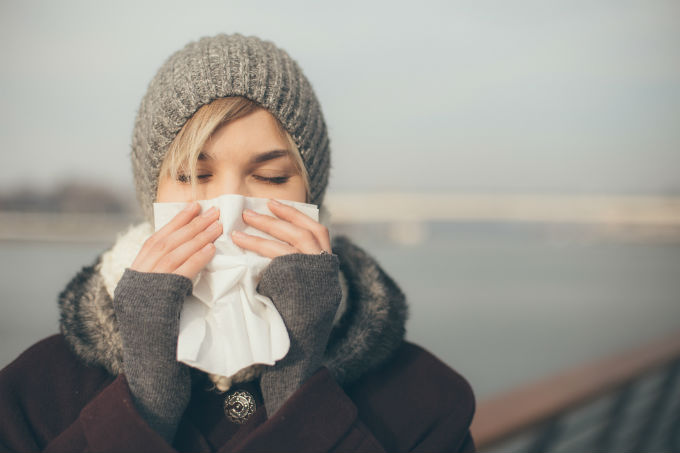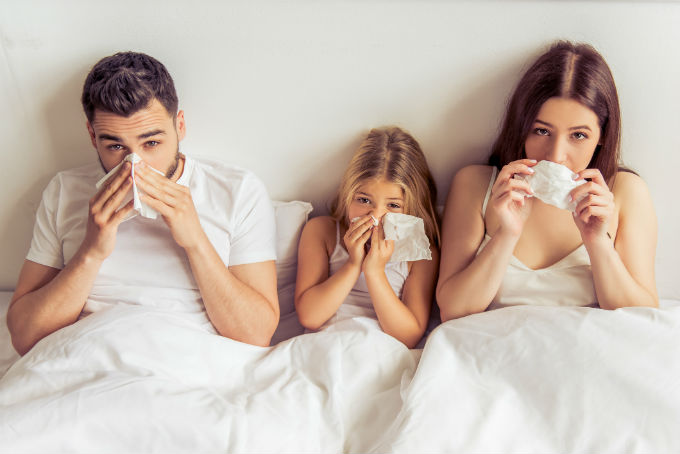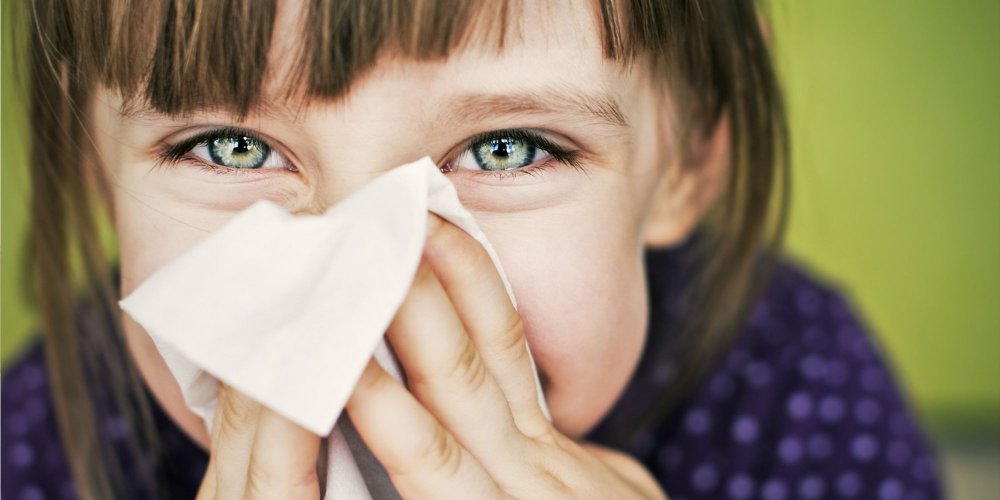If we are able to control most germs, it is because our immunity, permanently subjected to external agents, has learned to develop antibodies to control them.
Unfortunately, our body is not always strong enough to fight the germs and other viruses that hang in the air. Once sick, the obsession of those around us is to be touched in turn.
But, can we really "pass" our cold or our gastro to our children, husband / wife, friends and colleagues?
Cold: contagious or not?
Probably, but not everyone will be affected.
The cold can be transmitted if a sick person sneezes and spreads droplets containing the virus into the air. The people around can then inhale or touch a contaminated area (door handle, computer mouse, switch ...) by these droplets and become contaminated in turn by touching the eyes or nose.
Good to know, the risk of contaminating those around him with colds persists until the 5th day after the onset of the disease.
To avoid contaminating loved ones, coworkers and people sitting next to us in transport, we regularly wash our hands and put a tissue in front of his nose and mouth when sneezing.

Astarot / Istock
Can we transmit otitis or sinusitis?
Yes. Microbes that affect the ear or sinuses in the patient can even trigger bronchitis or angina in his entourage, but it all depends on where these viruses will settle.
The risk period is limited to a few hours before the first symptoms of the person affected (fever, cough, body aches ...) and the few days that follow.
Is the cough contagious?
First thing to do if you cough: go see a doctor. It will make a complete assessment and will prescribe, if necessary, local bronchodilator and anti-inflammatory drugs.
As for the contamination, it varies according to the presence or not of germs (it is sometimes a simple cough irritation) and the nature of these germs.
If it is a viral infection, after a few days, the defenses will have taken over, and there will be no risk.
However, if it is about bacteria (pneumococcus, germ of the tuberculosis) the risk of contagion exists well, even after all this time. Caution!

Marjan_Apostolovic / Istock
Can we catch a gastroenteritis by shaking a hand?
Yes and no. If it is a gastroenteritis due to the ingestion of a contaminated food (it is called food poisoning), there is no risk. However, if it is a viral gastroenteritis (or "stomach flu"), it is possible to be exposed for three or four days after the onset of the disease.
If digestive germs live in the stool, transmission is mainly by air, rarely by the hands and objects affected.
But, if the hygiene of a third person is insufficient (hand washing incomplete after the passage to the toilet or after the change of the baby suffering from diarrhea caused by rotavirus), the risk increases.
The best way to know if the gastro is viral and non-food, is to study the context: if there is an epidemic around you or the doctor sees a lot in his office, there is a good chance to be touched in turn.
Good actions to take to avoid contagion
It is essential to have a nickel hygiene.
It is better to favor tissues for single use and spare his entourage sneezing unwanted or verbal aggression too close!
Finally, you wash your hands regularly with soap. The right method? Rub your hands for at least 20 seconds (do not forget to insist between your fingers and pass on the wrists) and then dry with a towel or paper. In transport, hydroalcoholic gel can be used sparingly to disinfect the hands

robertprzybysz / Istock
Why do some people get sick more easily than others?
If our body is confronted with a virus that we have never met before, we are unlikely to escape. But if we have already met, our immune defenses have manufactured antibodies against the intruder, able to eradicate it. And the disease does not declare itself.
This is also what happens when a child returns from the nursery with chickenpox or measles. If we have ever had these childhood infectious diseases (or if we have been vaccinated against them), we have a stock of antibodies ready to put KO. germs. Otherwise, we will probably be sick.
The state of our immune defenses also depends on the balance of our diet, the quality of our sleep and our morale (the more we are stressed, the more vulnerable we are).
Finally, there are differences in individual sensitivity.
Smokers exposed to the viruses that cause bronchitis will develop this condition more easily than non-smokers, whose lungs are healthy. In addition, the risk of their condition worsening from bacterial superinfection will be significantly higher.
Ditto for the elderly and the anorexic. Their immune defenses are less powerful because of frequent nutritional deficiencies, their vulnerability is increased.

GeorgeRudy / Istock




